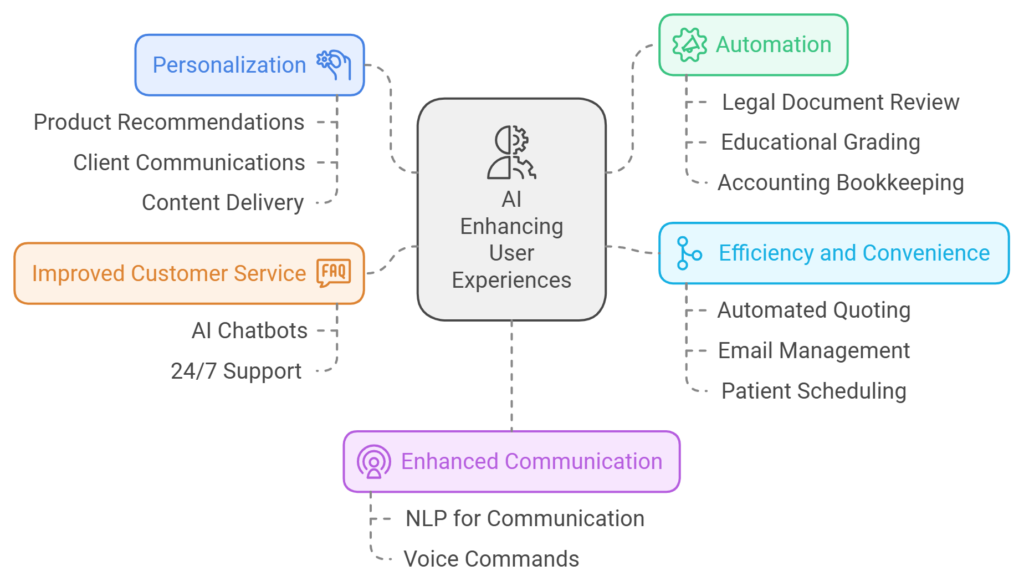AI technologies like machine learning and NLP can greatly improve user experiences with AI in various ways. Here are some examples:

-
- Personalisation: AI can be used to tailor services for customers. This includes offering personalised product recommendations in retail based on browsing and purchase history [1], personalising client communications in Customer Relationship Management (CRM) [2], and refining content delivery and personalising feeds in social networking [3, 4].
-
- Automation: AI can automate routine tasks, which can free up time for users to focus on other things. For example, in legal contexts, AI can be used for document review and analysis for quicker and more accurate legal research [2]. AI can also automate administrative tasks in education such as grading and scheduling [5] and improve user experiences with AI. In accounting firms, bookkeeping, invoice processing and financial reporting can all be automated by AI [5].
-
- Efficiency and Convenience: AI can be used to make processes more efficient and convenient for users. This includes using AI for automated quoting and invoicing [6], email management and drafting [6], and an automated ticketing system for faster customer support resolution [2]. In healthcare, AI can automate patient appointment scheduling, which reduces administrative burden and no-shows [1].
-
- Improved Customer Service: AI can be used to provide 24/7 customer support through AI chatbots. These chatbots can answer basic questions and route more complex inquiries to human agents [1]. In e-commerce, AI chatbots can handle customer enquiries and provide support at any time of day, which enhances customer satisfaction [7].
-
- Enhanced Communication: AI-powered NLP can facilitate seamless real-time communication and enhance user experience through sophisticated language understanding [8]. AI can be integrated into apps to allow users to connect with others through voice commands and hand gestures [9].
Overall, AI technologies like machine learning and NLP have the potential to greatly enhance user experiences by personalising services, automating tasks, improving efficiency and convenience, providing 24/7 support, and enhancing communication.
Contact us today to discuss your User Experiences with AI needs:
AI app development differs from traditional app development in several key ways, and improve user experiences with AI:
-
- Focus: While traditional app development primarily focuses on creating rule-based systems with pre-programmed functionalities, AI app development focuses on creating intelligent systems that can learn, adapt, and improve over time using data. Traditional app development focuses on executing predefined instructions, while improve user experiences with AI, AI app development allows apps to evolve and refine their responses based on data patterns and user interactions.
- Complexity: AI app development often involves more complex algorithms and data processing techniques than traditional app development. This can make AI app development more challenging and resource-intensive. For instance, integrating AI into existing mobile and desktop ecosystems without disruption can be complicated, especially when considering different platforms like iOS, Android, or cross-platform solutions like Flutter.
- Data Dependency: AI app development is heavily reliant on data for training and improvement. This requires careful consideration of data sources, quality, and privacy. AI app developers often need to curate large datasets to train AI models effectively. AI apps leverage these vast amounts of data to offer more dynamic, intuitive, and predictive user experiences. For Australian businesses, this data dependence also brings up data security and privacy concerns. Keeping data within Australia through private cloud hosting, as Digital On offers, can address this issue.
- Choose local: Get your AI software developed in Australia.